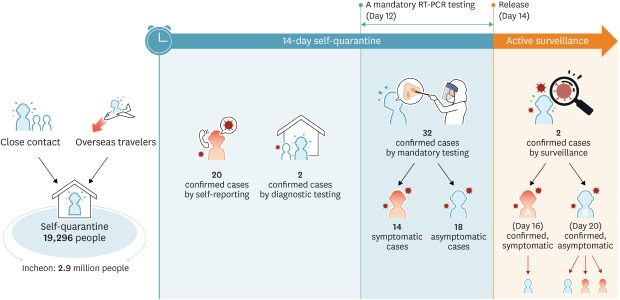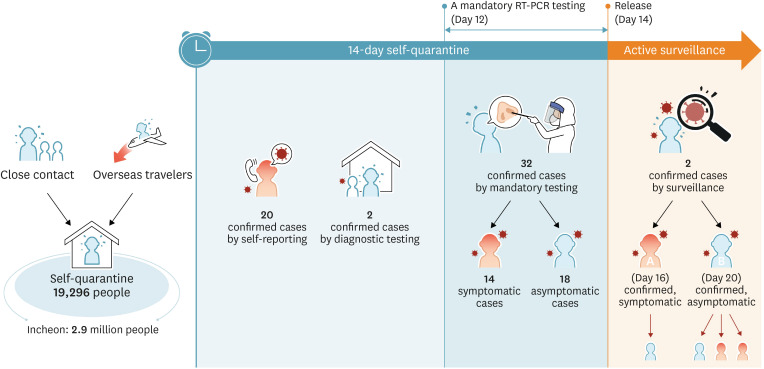Abstract
A 14-day quarantine is implemented in many countries in response to the coronavirus disease pandemic. Korea implemented a mandatory quarantine for those who had close contact with infected patients and those returning from abroad. The present study explored the implications of mandatory coronavirus disease 2019 testing before releasing individuals from the 14-day quarantine in Incheon, Korea. From February 11 to July 5, 2020, 19,296 people were self-quarantined, and 56 (0.3%) of them were confirmed cases of COVID-19. Twenty (35.7%) were identified through the reporting of symptoms during quarantine, and 32 (57.1%) were identified using mandatory pre-release RT-PCR tests. Among the 32, 14 (25%) individuals reported mild symptoms and 18 (32.1%) were asymptomatic. It is suggested that mandatory diagnostic testing prior to release and the symptom-based surveillance after the 14-day quarantine may help control delayed or asymptomatic COVID-19 cases.
Graphical Abstract

Countries are responding to the coronavirus disease 2019 (COVID-19) pandemic using strategies, such as mandatory quarantine and self-isolation enforced through epidemiological investigations, extensive diagnostic testing, and social distancing.1 A 14-day quarantine period is the international standard for people who have had close contact with confirmed cases and overseas travelers.2 Since January 20, 2020, Korea has used epidemiological investigations to implement a 14-day quarantine policy for those who have been in close contact with confirmed COVID-19 cases. On March 19th, a mandatory self-quarantine was introduced for all travelers entering the country.3 However, quantitative evidence on the effectiveness of 14-day quarantine is limited.
From February 11, 2020 to July 5, 2020, Incheon, Korea implemented a mandatory 14-day self-quarantine for people who had close contact with someone with confirmed COVID-19 and those who returned from abroad. Residents self-quarantined in their homes or in government-designated locations. The city's Department of Health tested all quarantined people for severe acute respiratory syndrome coronavirus 2 (SARS-CoV-2) infection on the 12–14th day of quarantine. Symptom-based surveillance during quarantine was conducted using cell phone applications, telephone interviews, and self-reports. Field epidemiologists conducted in-depth epidemiological investigations regarding the presence and onset of symptoms, contact tracing, and diagnostic testing on family members in the households of individuals who tested positive on the pre-release test. In addition, local health authorities operated a symptom-based surveillance system after quarantine release.
From February 11, 2020 to July 5, 2020, 19,296 people were self-quarantined in Incheon. Among them, there were 56 (0.3%) confirmed cases of COVID-19. Twenty (35.7%) were identified through the reporting of symptoms during quarantine, and thirty-two (57.1%) were identified using mandatory pre-release RT-PCR tests. Until confirmation, none of the 32 individuals reported symptoms.
A retrospective epidemiologic investigation revealed that 14 (25%) individuals reported mild symptoms and 18 (32.1%) were asymptomatic. In addition, two (3.6%) individuals tested negative and were asymptomatic before release, but subsequently reported symptoms or tested positive (Table 1). The delayed cases caused infection in their families, with four additional confirmed cases being found. The remaining two (3.6%) individuals tested positive during quarantine due to exposure to confirmed cases within their families (Fig. 1).
This study found that over half of COVID-19 individuals diagnosed during or after quarantine exhibited no symptoms. The 14-day quarantine period was based on the maximum incubation period of SARS-CoV-2.4 However, several studies have found outliers with a maximum incubation period of 19 days.5 This study shows that there are some outliers with incubation periods that exceed the 14-day quarantine period. In addition, asymptomatic infections hinder the identification of these cases without active diagnostic testing.
Incheon, which accounts for 7% of the country's population, was the only city in Korea that conducted mandatory diagnostic testing as a condition for quarantine release.
A limitation of this study is that we do not have detailed information on the of basic characteristics and clinical features of the individuals with confirmed COVID-19, or the location where testing was performed. The incidence of COVID-19 in Korea is currently relatively low, so these findings may not apply to other countries or settings where the risk of exposure differs from that in Incheon.
The present study shows that a significant number of cases may occur after the 14-day quarantine period ends, and suggests that mandatory diagnostic testing prior to release may help control delayed or asymptomatic COVID-19 cases. It also suggests the necessity of operating symptom-based surveillance even after the 14-day quarantine is over.
Notes
Author Contributions:
Conceptualization: Kim J, Kim A, Ko KP.
Data curation: Jung J, Jang H, Kim HK, Kim J, Ko KP.
Formal analysis: Jung J, Kim HK, Kim J.
Investigation: Jung J, Jang H.
Methodology: Jung J, Jang H, Kim A.
Project administration: Kim A.
Resources: Kim HK, Ko KP.
Supervision: Kim HK, Ko KP.
Visualization: Jung J.
Writing - original draft: Jung J.
Writing - review & editing: Ko KP.
References
1. Jung J, Noh JY, Cheong HJ, Kim WJ, Song JY. Coronavirus disease 2019 outbreak at nightclubs and distribution centers after easing social distancing: vulnerable points of infection. J Korean Med Sci. 2020; 35(27):e247. PMID: 32657088.

2. Centers for Disease Control and Prevention. Returning from International Travel. 2020. Updated 2020. Accessed June 14, 2020. https://www.cdc.gov/coronavirus/2019-ncov/travelers/after-travel-precautions.html.
3. Korea Centers for Disease Control and Prevention. COVID-19 Response Guidelines (Edition 8-1). 2020. Updated 2020. Accessed June 7, 2020. http://ncov.mohw.go.kr/shBoardView.do?brdId=2&brdGubun=28&ncvContSeq=2447.
4. Lauer SA, Grantz KH, Bi Q, Jones FK, Zheng Q, Meredith HR, et al. The incubation period of coronavirus disease 2019 (COVID-19) from publicly reported confirmed cases: estimation and application. Ann Intern Med. 2020; 172(9):577–582. PMID: 32150748.

Fig. 1
Schematic of the results showing the exposure, timing, and presence of symptoms among individuals identified as new cases by the investigation and surveillance system in Incheon, Korea, February 11, 2020 to July 5, 2020.
RT-PCR = reverse transcription polymerase chain reaction.

Table 1
Characteristics of 52 cases confirmed after self-quarantine from February 11 to July 4, 2020 in Incheon, Korea





 PDF
PDF Citation
Citation Print
Print



 XML Download
XML Download